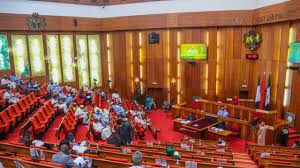The House of Representatives last week passed for second reading a constitution amendment bill seeking to introduce immunity clause to protect presiding officers of parliamentary houses in Nigeria from prosecution. JOSHUA EGBODO writes on it.
Wider immunity?
Last week’s move of the House of Representatives has been considered by many as attempt at widening the existing protection of lawmakers. The Legislative Houses’ Powers and Privileges Act made provisions for protection from prosecution of members of parliaments over actions or words said in the course of discharging their legislative duties. So why the new move has been the question many are asking.
The bill
Sponsored by Hon Olusegun Odebunmi, a member of the All Progressives Congress (APC), the bill sought to alter section 308 of the 1999 Constitution (as amended), which provides immunity from prosecution for the President, the Vice President, Governors and Deputy Governors while in office, by prescribing similar immunity for President of the Senate, Speaker of the House of Representatives, Deputy President of the Senate, Deputy Speaker of the House of Representatives, Speakers and Deputy Speakers of state Houses of Assembly.
Why it’s being promoted
Justifying the bill during debate on its general principles, Odebunmi said since democracy has obviously came to stay in Nigeria, there was need to make plans for the system to fit into the dynamics of what characterises a democratic society, noting that the legislature was of utmost importance to the survival of democracy, thus the need to further protect it.
He argued that in spite of the expected focus required of the parliament for discharging its functions effectively, the institution has suffered serious distractions in the past. “Either genuine or not, such distractions have had serious negative impact on quality of legislation(s) as well as discouraging presiding officers of the legislative institutions at national and state levels from taking the bull by the horn, or to take certain critical decisions when necessary for fear of the unknown.
“Therefore, for our democracy to continue flourishing, no action meant to strengthen the legislative institution could be out of proportion. Extending immunity to the presiding officers of the national and state assemblies is not a means of shielding them from answering any question generated by their actions or preventing members of the house from exercising their powers of choosing or changing their leaders when required as provided for by the laws, but a genuine way of protecting the most sacred institution in democracy”, he said.
Knocks, kudos
Members of the house were divided in their debate on the propriety or otherwise of the proposed legislation. Some saw it as an unnecessary intervention while others insisted it has to be.
The Minority Leader of the House, Hon Ndudi Elumelu, in opposing the bill said members of parliaments’ ultimate interest should be of raise welfare and security of their constituents, and also faulted the timing of the bill.
“Outside there, our people are being killed and butchered. We are coming up with a bill on issue of immunity while some of us are saying that people should be held accountable for what they do. I think it is wrong and it should not be allowed”, lawmaker said while insisting that the bill should be dropped.
Speaking in similar vein, Hon Sergius Ogun argued that the proposal came at a time when many Nigerians were insisting on the removal of immunity clause as constitutionally existing for the president, vice president, state governors and their deputies. “I do not think this is what we need today. Granted that the principal officers relate with the Executive (arm of government) from time to time, I don’t know what they need immunity for. I don’t think it is necessary”, he stated.
Also, Hon. Solomon Bob argued that if passed, the action would show that the members were seemingly indifferent to the lingering security challenges facing the country. “I rise to oppose the bill. We will be replicating the immunity (clause) in 76 places. In my mind, it is totally unnecessary. We do not need any immunity now. I’m already against immunity currently being enjoyed by the president and the governors. The basis for this bill is unnecessary. I vote against this bill totally”, he submitted.
However, speaking in support of its passage, Majority Leader of the House, Ado Doguwa said the bill is not about individuals, but about the parliament as an institution, adding that it should be passed as it proposed protection for leaders of the legislature, considering the important exercise of lawmaking.
Similarly, Nkem Abonta argued that prosecution of any of the presiding officers could affect the performance of members. “The office of the speaker may be harassed in frivolous suits. My morale may be low because my speaker is being harassed. When Saraki was taken to court, we felt demoralised. He was freed at last but calculate the embarrassment it caused the institution” he said.
The Deputy Minority Leader, Hon Toby Okechukwu curiously deviated from the position of Elumelu, insisting that the bill was needed as when enacted as law, it will guard against undue interferences with the legislature. “We are all witnesses to how presiding officers were subjected to trial. We should prevent such from happening again”.
Beyond the floor of the House, commentators were also divided over the bill. To many, it was not anything extraordinary, but many also saw same as self-serving.
Guarding against the Saraki, Ekweremadu ordeal?
Many analysts have described the proposal as a safety guard by the 9th House of Representatives against possible ordeals of former Senate President, Dr Bukola Saraki and his erstwhile deputy, Ike Ekweremadu, who were at different times arraigned over alleged failure to declare their assets in the manner prescribed for public officers by the Code of Conduct Bureau Act.
Both cases, in trials that were seen by many as politically motivated were later to be struck out by the Supreme Court and a Federal High Court in Abuja respectively.
Gbajabiamila’s admonition
Was it a case of morality of fear? Speaker Femi Gbajabiamila attempted to dissociate himself from the likely benefits of the proposed amendment, suggesting that a caveat should be inserted to in a manner that should give the law effect only after the expiration of tenure of the current leadership of the national parliament.
To sponsor of the bill, the Speaker said: “Hon Odebunmi, before you lead the debate, this bill seeks to confer immunity on presiding officers, correct? I am going to need clarifications on some things here. If this bill is for presiding officers, then, I cannot preside on this bill because there is an inherent conflict of interest. But if the bill seeks to confer immunity on subsequent presiding officers, after this assembly, then, perhaps, I may preside.
“I will suggest that if the bill does not have a futuristic commencement date, we should put a commencement date from 2023, so that I’m not conferred with any kind of immunity. That is my suggestion. But if you insist that it is supposed to be from this point, moving forward, as soon as the bill is signed, then I will need to step down.”
However, the chairman of the committee on judiciary, Hon Luke Onofiok, argued that since it is constitutional amendment, when passed and assented to by the president, the bill will have effect immediately, hence the need for commencement date does not apply. He said “since we are in the process of constitutional amendment, we should include it (the bill) there”.
What next?
Eventually, the bill scaled second reading last week, and was referred to the special Ad hoc committee on the review of the constitution (when constituted) for further legislative action. It is expected that the bill would be subjected to public scrutiny at a hearing. Whether it will get the endorsement of stakeholders, including the state Houses of Assembly as required by law, is unpredictable, and only time can tell.
Quote
Eventually, the bill scaled second reading last week, and was referred to the special Ad hoc committee on the review of the constitution (when constituted) for further legislative action. It is expected that the bill would be subjected to public scrutiny at a hearing. Whether it will get the endorsement of stakeholders, including the state Houses of Assembly as required by law, is unpredictable, and only time can tell.



